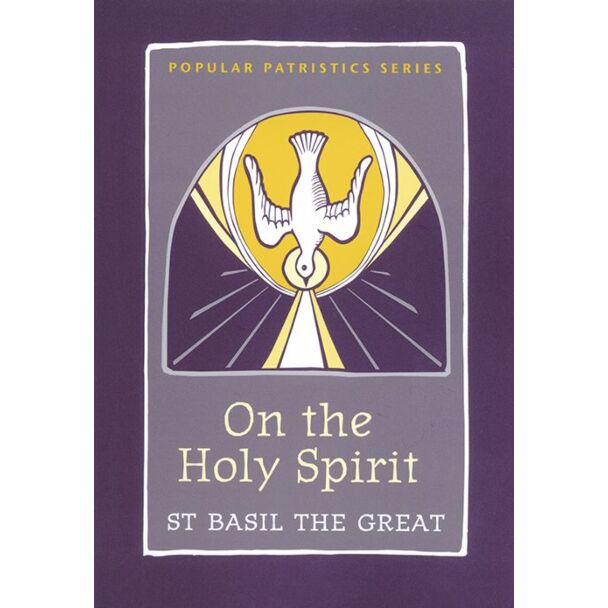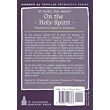On the Holy Spirit #42
St Basil the Great
Translation and Introduction by Stephen Hildebrand
Translation and Introduction by Stephen Hildebrand
Publication Data: Yonkers, NY: St Vladimir’s Seminary Press, 2011
Format: softcover
Number of Pages: 126
Dimensions (l × w × h): 18.4 cm × 12.7 cm × 0.9 cm
ISBN: 978‒0‒088141‒876‒7
St Basil the Great
Translation and Introduction by Stephen Hildebrand
Number 42 of Popular Patristics Series
“Basil wrote On the Holy Spirit in 373 and 375, answering the questions of Amphilochius of Iconium. The work has an A B A structure. If we leave behind the introduction and the conclusion, there are two treatises on prepositions[...]that form the first and last corresponding parts. The treatise on the Holy Spirit[...]forms the center (and, therefore, central) part of the work. In the first treatise on prepositions Basil argues against the heretics’ interpretation of the use of prepositions in the Scriptures and charges that they learned this approach to prepositions from pagan philosophers. He demonstrates from the Scriptures that their interpretation is groundless. The center and central part of Basil’s treatise alternates between positive statements of his understanding of the Holy Spirit and refutations of the ideas of his opponents. In the positive statements, Basil presents the scriptural teaching on the Holy Spirit. He gives the titles of the Spirit, recounts his activities, and offers analogies for understanding his communion with the Father. In the refutations of his opponents Basil takes on those who refuse to rank the Spirit with the Father and the Son, those who deny the Spirit’s role in baptism, those who number the Holy Spirit under the Father and the Son and subordinate him, and those who give the Spirit a middle position between God and creatures.”
—“Introduction”
CONTENTS
Acknowledgments
Introduction
1 On the necessity of the inquiry into the most minute matters in theology
2 On the origin of the heretics’ examination of words
3 That the logic-chopping with words is from pagan wisdom
4 That the Scriptures do not observe this use of these words
5 That “through whom” is said of the Father and “from whom,” of the Son and the Spirit
6 A reply to those who declare that the Son is not with the Father, but after the Father, in whom there is an equality in glory and honor
7 Against those who say that “through whom” and not “with whom” is fittingly predicated of the Son
8 On the manifold meaning of “through whom,” on the sense in which “with whom” is better, and on the way in which the Son takes a command and is sent
9 Distinct thoughts on the Holy Spirit following the teaching of the Scriptures
10 Against those who say that the Holy Spirit must not rank with the Father and the Son
11 That those who deny the Spirit are transgressors
12 Against those who say that baptism in the Lord is sufficient even by itself
13 A rendering of the reason why the angels are associated with the Father and the Son by Paul
14 The objection that some were baptized into Moses and believed in him; and the reply to this, in which is also a consideration of types
15 A reply to their objection that we are baptized also into water, and a treatment of baptism along the way
16 That the Holy Spirit is indivisible from the Father and the Son, in every thought, in the creation of intellectual substances, in the economy on behalf of men, and in the awaited judgment
17 Against those who say that the Holy Spirit is to be numbered not with the Father and the Son, but under them; and in this exposition there is also a general summary of the faith concerning the pious way of numbering [one] with [another]
18 How, in confessing three persons, we maintain the pious dogma of the monarchy; and along the way, a refutation of those who assert that the Spirit is sub-numerated
19 Against those who say that the Spirit is not glorified
20 Against those who say that the Spirit is neither in the rank of a slave nor in that of a master, but in that of free men
21 Witnesses from the Scriptures that the Spirit is called Lord
22 A proof of the Spirit’s communion in nature from the fact that like the Father and the Son, he is beyond comprehension
23 That to recount the Spirit’s properties is to glorify him
24 A refutation of the absurd position of those who do not glorify the Spirit from the additional fact that some creatures are glorified
25 That Scripture uses the word “in” in place of ”with” and that “and” has the same force as “with”
26 That “in” is spoken of the Spirit in as many ways as ”and” is found
27 Whence the word “with” began and what sort of meaning it has, and also a treatment of the non-scriptural customs of the Church
28 That the Scripture speaks of men as ruling with Christ, but our opponents do not grant the same things of the Spirit
29 An enumeration of the illustrious men of the Church who used the word “with” in their writings
30 Explanation of the present state of the churches
Select Bibliography
Format: softcover
Number of Pages: 126
Dimensions (l × w × h): 18.4 cm × 12.7 cm × 0.9 cm
ISBN: 978‒0‒088141‒876‒7
St Basil the Great
Translation and Introduction by Stephen Hildebrand
Number 42 of Popular Patristics Series
“Basil wrote On the Holy Spirit in 373 and 375, answering the questions of Amphilochius of Iconium. The work has an A B A structure. If we leave behind the introduction and the conclusion, there are two treatises on prepositions[...]that form the first and last corresponding parts. The treatise on the Holy Spirit[...]forms the center (and, therefore, central) part of the work. In the first treatise on prepositions Basil argues against the heretics’ interpretation of the use of prepositions in the Scriptures and charges that they learned this approach to prepositions from pagan philosophers. He demonstrates from the Scriptures that their interpretation is groundless. The center and central part of Basil’s treatise alternates between positive statements of his understanding of the Holy Spirit and refutations of the ideas of his opponents. In the positive statements, Basil presents the scriptural teaching on the Holy Spirit. He gives the titles of the Spirit, recounts his activities, and offers analogies for understanding his communion with the Father. In the refutations of his opponents Basil takes on those who refuse to rank the Spirit with the Father and the Son, those who deny the Spirit’s role in baptism, those who number the Holy Spirit under the Father and the Son and subordinate him, and those who give the Spirit a middle position between God and creatures.”
—“Introduction”
CONTENTS
Acknowledgments
Introduction
1 On the necessity of the inquiry into the most minute matters in theology
2 On the origin of the heretics’ examination of words
3 That the logic-chopping with words is from pagan wisdom
4 That the Scriptures do not observe this use of these words
5 That “through whom” is said of the Father and “from whom,” of the Son and the Spirit
6 A reply to those who declare that the Son is not with the Father, but after the Father, in whom there is an equality in glory and honor
7 Against those who say that “through whom” and not “with whom” is fittingly predicated of the Son
8 On the manifold meaning of “through whom,” on the sense in which “with whom” is better, and on the way in which the Son takes a command and is sent
9 Distinct thoughts on the Holy Spirit following the teaching of the Scriptures
10 Against those who say that the Holy Spirit must not rank with the Father and the Son
11 That those who deny the Spirit are transgressors
12 Against those who say that baptism in the Lord is sufficient even by itself
13 A rendering of the reason why the angels are associated with the Father and the Son by Paul
14 The objection that some were baptized into Moses and believed in him; and the reply to this, in which is also a consideration of types
15 A reply to their objection that we are baptized also into water, and a treatment of baptism along the way
16 That the Holy Spirit is indivisible from the Father and the Son, in every thought, in the creation of intellectual substances, in the economy on behalf of men, and in the awaited judgment
17 Against those who say that the Holy Spirit is to be numbered not with the Father and the Son, but under them; and in this exposition there is also a general summary of the faith concerning the pious way of numbering [one] with [another]
18 How, in confessing three persons, we maintain the pious dogma of the monarchy; and along the way, a refutation of those who assert that the Spirit is sub-numerated
19 Against those who say that the Spirit is not glorified
20 Against those who say that the Spirit is neither in the rank of a slave nor in that of a master, but in that of free men
21 Witnesses from the Scriptures that the Spirit is called Lord
22 A proof of the Spirit’s communion in nature from the fact that like the Father and the Son, he is beyond comprehension
23 That to recount the Spirit’s properties is to glorify him
24 A refutation of the absurd position of those who do not glorify the Spirit from the additional fact that some creatures are glorified
25 That Scripture uses the word “in” in place of ”with” and that “and” has the same force as “with”
26 That “in” is spoken of the Spirit in as many ways as ”and” is found
27 Whence the word “with” began and what sort of meaning it has, and also a treatment of the non-scriptural customs of the Church
28 That the Scripture speaks of men as ruling with Christ, but our opponents do not grant the same things of the Spirit
29 An enumeration of the illustrious men of the Church who used the word “with” in their writings
30 Explanation of the present state of the churches
Select Bibliography
Write Your Own Review






